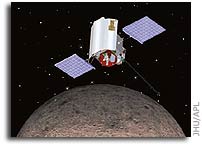Three New Co-Investigators Added to MESSENGER Team

Brian Anderson, Louise Prockter, and Thomas Zurbuchen have been appointed MESSENGER Co-Investigators by NASA Science Mission Directorate Associate Administrator Edward Weiler.
“Each of these individuals has served admirably as MESSENGER Instrument Scientists, and each has led an important aspect of the analysis and interpretation of MESSENGER observations from the first two Mercury flybys,” notes MESSENGER Principal Investigator Sean Solomon.
As a MESSENGER Deputy Project Scientist, Anderson, of the Johns Hopkins University Applied Physics Laboratory (APL), oversees the orbital operations planning to ensure that observations from all of the instruments are coordinated to meet the mission objectives. He formerly served as the Magnotometer Instrument Scientist. In his additional role as Co-Investigator, Anderson will provide scientific direction to the operation of the Magnetometer instrument in orbit, including in-flight calibration, data validation, science product generation, and coordination with the operation of and data returned from other instruments closely related to investigation of Mercury’s magnetic field. In addition, he will lead aspects of the science analysis of data from the Magnetometer and other instruments in understanding Mercury’s internal magnetic field and magnetosphere, particularly efforts to identify and quantify the magnetospheric contributions to the observations so as to recover the structure of Mercury’s internal magnetic field to the highest fidelity possible.
Prockter, also of APL, serves as the Instrument Scientist for the Mercury Dual Imaging System (MDIS). In her new role as Co-Investigator, she will provide scientific direction to the operation of MDIS in Mercury orbit, including instrument calibration, data validation, science product generation, and coordination with the operation of and data returned from other instruments related to observations of Mercury’s surface. In addition, she will lead aspects of the science analysis of MDIS observations to improve our understanding of the geological evolution of Mercury, particularly the study of impact melting during the formation of large craters and basins on Mercury and the contribution of impact melts to smooth plains deposits.
Zurbuchen, of the University of Michigan, is the Instrument Scientist for the Energetic Particle and Plasma Spectrometer. As a Co-Investigator, he will provide scientific direction to the operation of the Fast Imaging Plasma Spectrometer (FIPS) sensor in orbit, including calibration, data validation, science product generation, and coordination with the operation of and data returned from other instruments sensitive to the exosphere and magnetosphere. He will also lead aspects of the science analysis of data from FIPS and other instruments in understanding Mercury’s charged particle environment, particularly the analysis of the distribution of plasma ions in Mercury’s vicinity and the implications of their energies and compositions for magnetosphere-solar wind interaction at Mercury.
“MESSENGER is one of the most important things I am working on and has accompanied me and my team for over 10 years,” Zurbuchen says. “We look forward to the next 10 years of science data and breakthroughs that will come from MESSENGER, and particularly from the Fast Imaging Plasma Spectrometer.”
MESSENGER Engineer Helps Manage Probe’s Data
Like many young boys of his generation, MESSENGER Team Member Ray Espiritu grew up wanting to fly through space and to design video games. A lack of perfect vision and color blindness prevented him from becoming an astronaut. So, armed with a B.S. in mechanical engineering and a master’s in astronautical engineering, he set to make his mark as a satellite missions operations engineer. To read about how Espiritu and his colleagues at Applied Coherent Technology (ACT), Inc., help preserve the science that fulfills objectives of the MESSENGER mission, click here.
MESSENGER (MErcury Surface, Space ENvironment, GEochemistry, and Ranging) is a NASA-sponsored scientific investigation of the planet Mercury and the first space mission designed to orbit the planet closest to the Sun. The MESSENGER spacecraft launched on August 3, 2004, and after flybys of Earth, Venus, and Mercury will start a yearlong study of its target planet in March 2011. Dr. Sean C. Solomon, of the Carnegie Institution of Washington, leads the mission as Principal Investigator. The Johns Hopkins University Applied Physics Laboratory built and operates the MESSENGER spacecraft and manages this Discovery-class mission for NASA.








